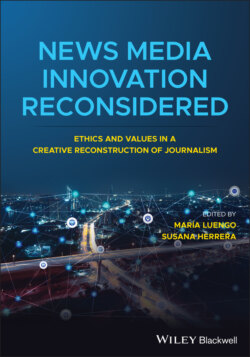Читать книгу News Media Innovation Reconsidered - Группа авторов - Страница 41
Values, Attachments, and Emotions
ОглавлениеHow does objectivity co-exist with values, goals, attachments, and emotions? Are not these elements of human psychology subjective. Do they not bias inquiry?
The answer is that emotions, values, and goals are necessary elements of thinking and inquiry. They can empower objective investigations, or they can lead to bias. It all depends on how we employ the volitional and emotional parts of our human nature.
The importance of finding a way to mix value, emotion, and objectivity in journalism is clear. The daily news is full of implicit or explicit value judgments—tales of winners and losers, good guys and bad guys. Reporters cannot avoid evaluative language in reporting on unfair bosses, brutal massacres, vicious murders, notorious pedophiles, and dangerous terrorists. Journalists employ evaluations in selecting credible sources or displaying skepticism toward a new “scientific” theory. Journalists report on gruesome scenes of disaster, and can themselves be affected emotionally. To enter journalism is to enter an emotive, value-laden craft. New journalists learn more than the skills of writing news and gathering information. They acculturate into a realm of reporting routines, news values, and peer attitudes. Thus, a theory of objectivity should take into account these value-laden activities. Democratically engaged journalism starts from the premise that all journalists have values and goals. Therefore, the issue is not whether journalists have goals but what goals they seek and how they seek them.
There is no automatic formula by which journalists can test values and goals for objectivity. There is only thoughtfulness, the diligent application of rationality, and the asking of probing questions. Journalists should ask: Do the facts of the case support the value judgment? Does the value judgment cohere with my other values and goals? Have I come to my judgment with a sufficient degree of critical distance? Do I provide reasons for pursing such goals that are acceptable, or at least understandable, to other rational agents?
But, what about journalists’ attachments to groups? If the claim is only that journalists have attachments to groups, then democratically engaged journalism agrees. But there are stronger claims made in this area: that journalists should or should not have attachments. Activist journalists support the former claim. Neutral journalists subscribe to the latter claim.
Democratically engaged journalism thinks it is ethically permissible and often desirable that journalists report or opine for specific groups, such as gays, libertarians, or Catholics. Such forms of journalism provide additional perspectives on issues. However, group-attached journalists need to report objectively on their favored groups and causes. Moreover, they also have to rank the priority of their group attachments. Journalists should make primary their attachment to the common good of the public as a whole. A commitment to the public at large regulates and trumps attachments to more specific groups.
Why stress the ranking of attachments? Because there is, in group-attached journalism, the constant danger that bias toward one’s group can override one’s fundamental duty to inform the general public. Where serving a particular group clashes with serving the public, the latter must prevail. If it is in the public interest to inform society about problems within a minority or marginalized group, it is the ethical duty of any journalist to report these facts. For example, activist journalists who support an environmental group may not report inconvenient counter-facts to their group’s position. But attachments can be ethically dubious. One can be, for example, a committed neo-Nazi. Committed journalism can be a journalism of inflexible ideology, or of faction.
Meanwhile, democratically engaged journalism has a positive view of emotions, when used properly. Emotions in general are an important form of access to the world. They have cognitive functions. They help us know the world and pay attention to aspects we might ignore. Feelings of injustice can motivate courageous journalism, and empathy can prompt journalists to pay attention to people in distress. The issue is to be attentive to the emotions we have as journalists and develop healthy habits of emotions. There should be no call to repress emotions in general. Better discussions of emotion are much needed in journalism ethics.31
Psychologists have studied how emotions are necessary to rationality and to good thinking. Antonio Damasio, for example, has found that when brain injuries rob people of certain emotional capacities, they become unable to plan rationally or to react appropriately to other people.32 Adam Morton asks us to imagine the hypothetical example33 of a brilliant young scientist who is capable of working efficiently in her field but will never make fundamental advances because she lacks the empowering emotions of curiosity and awe at nature.34 It is like being a musical savant with great technical prowess but lacking a love of music.
Moreover, my analysis of pragmatic objectivity presumes the importance of volition for rational inquiry. People must be willing to adopt the objective stance, with its restrictions and methodological demands. One must want to be objective. One needs a passion for rationality and truth. Similarly, people who irrationally and dogmatically refuse to alter their biased opinions, despite strong counter-evidence, is explained, psychologically, by the force of volition, emotion, and desire. Such people may defend their views by exercising what I call a “fake” rationality. They fly under the colors of genuine rationality, by showing a false concern for truth, fact, and rigorous method.
Both individuals and societies face a choice between embracing or not embracing objectivity in the formation of their beliefs and in their public deliberation. Ultimately, upon that choice, rests the future of rational, egalitarian democracy.
